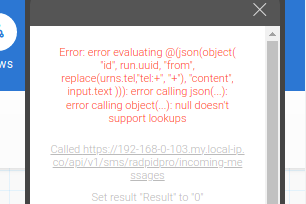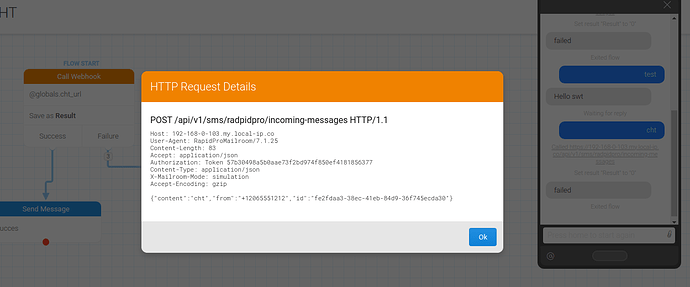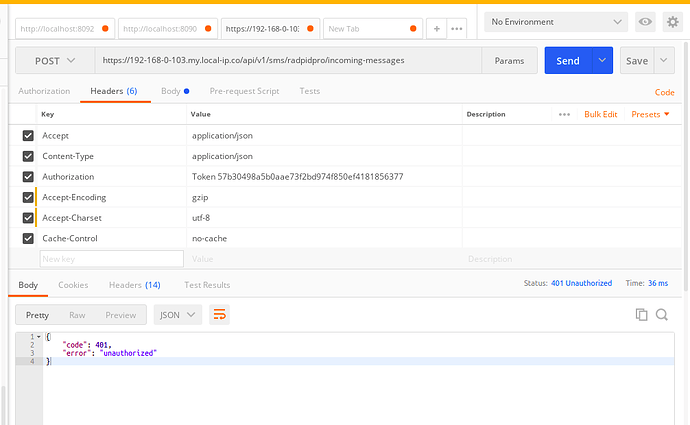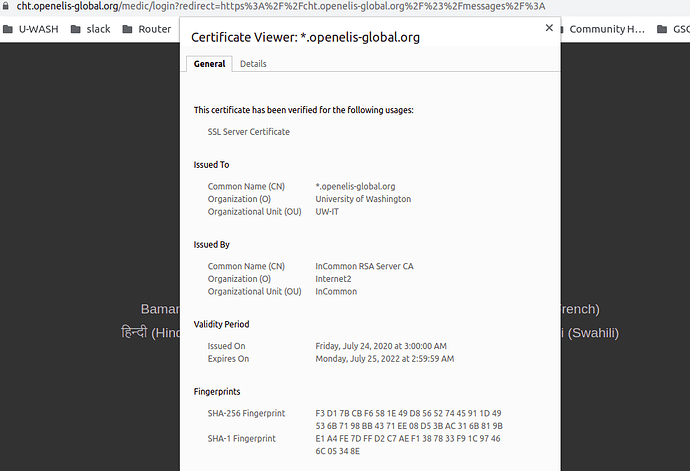@diana ,
i want to setup the cht-gateway and connect it to my local instance ie
https://192-168-0-103.my.local-ip.co/
but the app is thorwing error
URL not responding in expected way .
Note that i acces my instance from a browser with the above url
Hi @mozzy
Can you please try using https://192-168-0-103.my.local-ip.co/api/sms as the URL you set in Gateway?
For simplicity, include your basic auth in the URL, choosing an account that is either an admin or has the can_access_gateway_api permission.
Thanks @diana
great , i can see it
https://username:password@example.com/cht-gateway-api-endpoint
Thanks @diana ,
it has perfectly worked.
Now i was trying out an integration with Rapid pro.
i succesfully set up my Rapid pro account , but its still failing to integrate with my CHT instance .
updated my app_settings with
"sms": {
"outgoing_service": "rapidpro",
"rapidpro": {
"url": "https://textit.com/"
}
}
When i simulate my work flow with in my Rapid Pro instance ,i get this
And also i see this error in the simulator screen

.I also tried to Post directly the message content to the CHT rapidPro endpoint , but i get
{
"code": 401,
"error": "unauthorized"
}
Hi @mozzy
In both your screenshots, there’s a typo in your URL: “radpidpro” instead of “rapidpro”.
Yeah , i realised that , but looks like thats the route path defined in the controller.
its a typo in the code base and on the documentation
Oh wow, thanks for signaling that!
Can you please share which version of cht-core you’re running?
Ideally i tried correcting it to rapidpro but same results
services:
medic-os:
container_name: medic-os
image: medicmobile/medic-os:cht-3.9.0-rc.2
volumes:
- medic-data:/srv
ports:
- "${CHT_HTTP:-80}:80"
- "${CHT_HTTPS:-443}:443"
working_dir: /srv
depends_on:
- haproxy
networks:
- medic-net
environment:
- DOCKER_NETWORK_NAME=haproxy
- DOCKER_COUCHDB_ADMIN_PASSWORD=${DOCKER_COUCHDB_ADMIN_PASSWORD:-password}
haproxy:
container_name: haproxy
image: medicmobile/haproxy:rc-1.17
volumes:
- medic-data:/srv
environment:
- COUCHDB_HOST=medic-os
- HA_PASSWORD=${DOCKER_COUCHDB_ADMIN_PASSWORD:-password}
networks:
- medic-net
volumes:
medic-data:
name: medic-data
networks:
medic-net:
name: medic-net
Indeed there’s a typo in the route (/api/v1/sms/radpidpro/incoming-messages) so please continue using that!
The integration with RapidPro was added in version 3.11.0: RapidPro Messaging Gateway | Community Health Toolkit
Could you please upgrade to at least 3.11.0 (or preferably 3.13.0 which is latest)?
Thanks @diana ,
so looks like its only the latest tag availlable , which is newer than the cht-3.9.0-rc.2.
Switched to using the latest tag , but same error
Ok , as a matter of fact , the latest tag was pushed more than a year ago , and this commit to integrate Rapid pro was pushed on Apr 9, 2021 , which is less that a year
looks like theres no public published image with RapiPro integration
I believe that you should upgrade the CHT version inside the container to get the latest. Maybe this is useful: Can't upgrade to 3.8 version
We can integrate a github action in the ci build pipeline that builds and publishes images to the Gihub container registry on every PR ,or merge
woow, thats a perfect feature.
let me try it out
Thanks @mrjones and @diana ,
i have upgraded my instance to the latest.
i can now succesfully diretly post a message via the api using Postman ![]()
Let me try RapidPro
RapidPro also worked fine
This will be the case in the next major version 4.0. coming later this year.
@mozzy - You are correct that the medic-os image on docker hub has not been updated recently. It ships with 3.9.1 However, you can follow these steps to update your instance to 3.13. Assuming your URL is https://192-168-0-103.my.local-ip.co/:
- Login as admin
- Go to the Admin menu in the upper right hamburger. You should be on
https://192-168-0-103.my.local-ip.co/admin/ - Click the “Upgrades” link on the left so you’re on
https://192-168-0-103.my.local-ip.co/admin/#/upgrade. At the top of the page it should sayVersion 3.9.1 - Find
3.13.0from Sep 28, 2021 listed below and click the far right button “Install” - Choose “Confirm” to start the upgrade. The upgrade may take some minutes -
- Wait for the upgrade to proceed
- Click “Reload application” when prompted
- It should now say “Version 3.13.0” at the top.
UPDATE - oops - step 3 had the wrong side of the screen - my apologies!
@diana ,
i set up a CHT test instance on AWS , and installed some valid certificates .
This works fine on all browsers but the CHT-gateway Andorid app still throws SSL connection failed while the cht android app throws ‘Unable to contact server’
see Chrome validates the certificate
May be you could find these Nginix logs useful
- error-ssl.log
2022/01/14 08:44:00 [error] 460#0: *7 connect() failed (111: Connection refused) while connecting to upstream, client: 41.210.146.124, server: _, request: "GET / HTTP/1.1", upstream: "http://127.0.0.1:5988/", host: "cht.openelis-global.org"
2022/01/14 08:44:00 [error] 460#0: *7 connect() failed (111: Connection refused) while connecting to upstream, client: 41.210.146.124, server: _, request: "GET / HTTP/1.1", upstream: "http://127.0.0.1:5988/", host: "cht.openelis-global.org"
2022/01/14 08:44:00 [error] 460#0: *7 open() "/srv/storage/medic-core/nginx/data/html/50x.html" failed (2: No such file or directory), client: 41.210.146.124, server: _, request: "GET / HTTP/1.1", upstream: "http://127.0.0.1:5988/", host: "cht.openelis-global.org"
2022/01/14 08:44:00 [error] 460#0: *7 no live upstreams while connecting to upstream, client: 41.210.146.124, server: _, request: "GET /favicon.ico HTTP/1.1", upstream: "http://medic-api/favicon.ico", host: "cht.openelis-global.org", referrer: "https://cht.openelis-global.org/"
2022/01/14 08:44:00 [error] 460#0: *7 open() "/srv/storage/medic-core/nginx/data/html/50x.html" failed (2: No such file or directory), client: 41.210.146.124, server: _, request: "GET /favicon.ico HTTP/1.1", upstream: "http://medic-api/favicon.ico", host: "cht.openelis-global.org", referrer: "https://cht.openelis-global.org/"
The other log files are empty
Thanks for reporting, @mozzy
I tried your host on my mobile device using CHT-Android and I’m getting the same error.
I’m also getting the an error when I try to access the URL on Firefox on my Android device, Chrome works however.
Pasting the whole Java error here for reference:
2022-01-14 14:31:50.430 18284-18398/org.medicmobile.webapp.mobile D/MedicMobile: Exception caught trying to verify url: https://cht.openelis-global.org
javax.net.ssl.SSLHandshakeException: java.security.cert.CertPathValidatorException: Trust anchor for certification path not found.
at com.android.org.conscrypt.SSLUtils.toSSLHandshakeException(SSLUtils.java:363)
at com.android.org.conscrypt.ConscryptEngine.convertException(ConscryptEngine.java:1134)
at com.android.org.conscrypt.ConscryptEngine.readPlaintextData(ConscryptEngine.java:1089)
at com.android.org.conscrypt.ConscryptEngine.unwrap(ConscryptEngine.java:876)
at com.android.org.conscrypt.ConscryptEngine.unwrap(ConscryptEngine.java:747)
at com.android.org.conscrypt.ConscryptEngine.unwrap(ConscryptEngine.java:712)
at com.android.org.conscrypt.ConscryptEngineSocket$SSLInputStream.processDataFromSocket(ConscryptEngineSocket.java:858)
at com.android.org.conscrypt.ConscryptEngineSocket$SSLInputStream.access$100(ConscryptEngineSocket.java:731)
at com.android.org.conscrypt.ConscryptEngineSocket.doHandshake(ConscryptEngineSocket.java:241)
at com.android.org.conscrypt.ConscryptEngineSocket.startHandshake(ConscryptEngineSocket.java:220)
at com.android.okhttp.internal.io.RealConnection.connectTls(RealConnection.java:196)
at com.android.okhttp.internal.io.RealConnection.connectSocket(RealConnection.java:153)
at com.android.okhttp.internal.io.RealConnection.connect(RealConnection.java:116)
at com.android.okhttp.internal.http.StreamAllocation.findConnection(StreamAllocation.java:186)
at com.android.okhttp.internal.http.StreamAllocation.findHealthyConnection(StreamAllocation.java:128)
at com.android.okhttp.internal.http.StreamAllocation.newStream(StreamAllocation.java:97)
at com.android.okhttp.internal.http.HttpEngine.connect(HttpEngine.java:289)
at com.android.okhttp.internal.http.HttpEngine.sendRequest(HttpEngine.java:232)
at com.android.okhttp.internal.huc.HttpURLConnectionImpl.execute(HttpURLConnectionImpl.java:465)
at com.android.okhttp.internal.huc.HttpURLConnectionImpl.getResponse(HttpURLConnectionImpl.java:411)
at com.android.okhttp.internal.huc.HttpURLConnectionImpl.getResponseCode(HttpURLConnectionImpl.java:542)
at com.android.okhttp.internal.huc.DelegatingHttpsURLConnection.getResponseCode(DelegatingHttpsURLConnection.java:106)
at com.android.okhttp.internal.huc.HttpsURLConnectionImpl.getResponseCode(HttpsURLConnectionImpl.java:30)
at org.medicmobile.webapp.mobile.SimpleJsonClient2.get(SimpleJsonClient2.java:50)
at org.medicmobile.webapp.mobile.SimpleJsonClient2.get(SimpleJsonClient2.java:38)
at org.medicmobile.webapp.mobile.AppUrlVerifier.verify(AppUrlVerifier.java:23)
at org.medicmobile.webapp.mobile.SettingsDialogActivity$AppUrlVerificationTask.doInBackground(SettingsDialogActivity.java:44)
at org.medicmobile.webapp.mobile.SettingsDialogActivity$AppUrlVerificationTask.doInBackground(SettingsDialogActivity.java:37)
at android.os.AsyncTask$3.call(AsyncTask.java:394)
at java.util.concurrent.FutureTask.run(FutureTask.java:266)
at android.os.AsyncTask$SerialExecutor$1.run(AsyncTask.java:305)
at java.util.concurrent.ThreadPoolExecutor.runWorker(ThreadPoolExecutor.java:1167)
at java.util.concurrent.ThreadPoolExecutor$Worker.run(ThreadPoolExecutor.java:641)
at java.lang.Thread.run(Thread.java:920)


